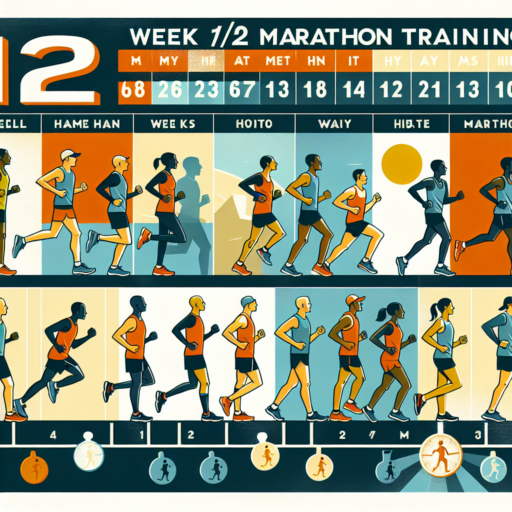What is the best training for a marathon?
The quest to uncover the best training for a marathon hinges on understanding the unique needs and goals of the individual runner. While no one-size-fits-all regimen exists, key components universally stand out for their critical role in preparing athletes for the grueling 26.2 miles. A balanced approach that includes varied intensity runs, mileage building, and recovery strategies forms the core of effective marathon training.
Varied intensity runs are paramount for building both endurance and speed. Incorporating long runs, at a slower pace to increase overall distance stamina, with tempo runs, aimed at improving lactate threshold and running efficiency, offers a well-rounded approach. Additionally, introducing interval training can significantly enhance VO2 max, pushing your body to adapt to higher levels of exertion more efficiently. These diverse training stimuli converge to elevate a runner’s ability to sustain pace and power through the final miles of the marathon.
Equally critical to the regimen is the strategic building of mileage. Incrementally increasing the weekly distance builds the physical and mental resilience necessary for marathon success. However, it is imperative to balance this with adequate recovery, incorporating rest days and low-intensity cross-training to prevent overuse injuries. This careful progression allows for muscular adaptation and strengthens the cardiovascular system, laying down the foundation for peak marathon performance.
No se han encontrado productos.
How many months do you need to train for a marathon?
Training for a marathon is a significant commitment, and understanding the optimal duration can make all the difference in your preparation. Generally, most marathon training plans range from 12 to 20 weeks, depending on your current fitness level, running experience, and goals for the race. This timeframe allows for a gradual increase in mileage, helping to build endurance while minimizing the risk of injury.
For beginners, a 20-week plan is advisable. This period provides ample time to acclimate to the rigors of running longer distances. You’ll start with shorter runs, gradually increasing the distance each week. This slow build helps to condition your body, enhances your stamina, and prepares your mind for the challenge ahead. It’s crucial to incorporate rest days and cross-training activities to prevent overuse injuries and maintain overall balance and fitness.
Experienced runners might opt for a shorter training period of about 12 to 16 weeks. If you already have a strong running foundation and have completed races of similar distances, you might not need as much time to prepare. Your focus would likely shift towards improving your time, enhancing your stride efficiency, and fine-tuning your race strategy. Regular long runs, tempo workouts, and interval training become key components of your training regimen during this phase.
What is the training program for a marathon?
Embarking on a marathon requires a comprehensive training program designed to enhance your endurance, strength, and speed. At its core, a marathon training program is a structured plan that spans several months, meticulously preparing runners for the physical and mental challenges of covering 26.2 miles. The essence of the program lies in gradually increasing mileage, incorporating varied workouts, and ensuring proper rest and recovery.
Key components of a marathon training program include long runs, scheduled once a week to gradually extend the runner’s endurance capabilities. These runs are crucial for adapting the body to long distances. Additionally, the program integrates speed work, such as interval training or tempo runs, to improve cardiovascular efficiency and running pace. Equally important are recovery runs, which facilitate active recovery and injury prevention by allowing the muscles to ease back from the intensity of speed work and long runs.
Moreover, a successful marathon training program places a significant emphasis on cross-training activities such as swimming, cycling, or strength training. These activities contribute to overall fitness, enhance running performance, and prevent overuse injuries by balancing muscle groups. Adequate rest days are interspersed within the program to permit the body to repair and strengthen itself in response to the training stimulus.
How many times should I run 20 miles before a marathon?
Preparing for a marathon requires a strategic approach, especially when it comes to long runs. The number of times you should run 20 miles before a marathon is a common question among runners seeking to optimize their training. Traditional running plans often recommend 1 to 3 runs of this distance in the final weeks leading up to the race. This methodology aims to acquaint your body with the endurance demands of the marathon distance without overtraining or risking injury.
Understanding the balance between adequate preparation and rest is crucial in the weeks before the marathon. Running 20 miles too often can lead to fatigue and diminish your performance on race day. As a rule of thumb, spacing these long runs at least three to four weeks apart allows for recovery and continued training without burnout. The focus should be on gradually increasing your distance in the months prior, rather than suddenly jumping to 20-mile runs.
The role of 20-mile runs in your training regimen cannot be understated. They serve not only to build physical endurance but also to mentally prepare you for the challenge ahead. However, the quality of these runs often outweighs the quantity. Paying attention to your body’s response to these long distances is key. If recovery from a 20-mile run takes longer than expected, it might be a sign to adjust your training plan.




